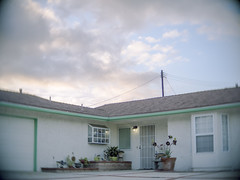Finding the Value in Less-Valuable Property
The Answer Is Not ‘Find Buried Treasure Under It.’ Sorry.
 One of the often-repeated lessons in the thousands of “Property Investment for Beginners” websites, seminars, classes, and other material out there is the simple precept Don’t Invest in Low-Income Neighborhoods (or some variation on that theme.) But like every rule in life, there are exceptions that prove the rule — and in this case, several of those exceptions are things that you as the property investor can accomplish. So let’s talk about when it’s OK to invest in less-valuable property.
One of the often-repeated lessons in the thousands of “Property Investment for Beginners” websites, seminars, classes, and other material out there is the simple precept Don’t Invest in Low-Income Neighborhoods (or some variation on that theme.) But like every rule in life, there are exceptions that prove the rule — and in this case, several of those exceptions are things that you as the property investor can accomplish. So let’s talk about when it’s OK to invest in less-valuable property.
Dealbreakers
OK, we just said every rule has exceptions — but this one rule’s exceptions are so rare and complex that it’s better to treat this one as rock-solid. There are three absolute dealbreakers that should always make you walk away from a property:
- A property crime rate that is distinctly above the local, state, and national averages in an area centered near the property.
- An area known to be disaster-prone. Most often a flood plain, but there are definitely places in the country where, for example, wildfires have come through every 2-4 years for as far back as anyone can remember. Yeah, no: move on.
- The type of new construction in the neighborhood that indicates that industry is moving in — and people are moving out. Investing in a nice house just to find out that the new neighbor is a cereal factory or a steel mill is…lame.
One Man’s Trash
Less-valuable properties are a lot like used cars — they come in three varieties. There’s the ones that look great but need significant internal repair, the ones that look like trash but function well, and the ones that are just scrap that no one has taken the tires off of yet. The key to value is in that second group — a house that has no plumbing, wiring, or major structural problems but looks dilapidated because the siding sucks and the windows are broken…we call that an opportunity.
Worth the Rebuild
On the other hand, even the “scrap on tires” kind of house can be a great investment — if it happens to be in a crucial location. If you can find a trashed house wedged between a mall and a college with an exit to a major highway a block away, well, you can pay money to have that house removed, build an entirely new house, and still get a great investment out of it. Situations like that are rare, but should rarely be passed up.
Look 6-18 Months Ahead
Property values are based on what is currently happening in a neighborhood — not what will happen. Which means if you can find a house that is currently adjacent to a loud, nasty construction project that no one wants to live next to and buy it today on the cheap, once that project has turned into a brand-new Target or Walgreens, your property values will skyrocket and you can turn your investment into a stream of income far beyond its outlay.
Cash Flow is King
When it comes to investing in low-value properties, you’re not going to get a lot of movement over the long-term in monetary terms. Your investment’s profitability is going to come from cash flow — the difference between monthly expenses and monthly income. That means that anything you can do to minimize your monthly expenses — like putting out a large down payment to minimize mortgage payments — is going to help you get out of the ‘paying off’ stage and into the ‘making money’ stage that much faster.
Investing in a less-valuable property, even in a low-income neighborhood, doesn’t have to be the straight no-no that most investor-oriented courses say it is. It just requires an understanding of what you’re getting into and what attributes are making the property/neighborhood ‘low-value’ in the first place.
Hi, I was seeing homes available for sale as low as $1500. Are those rentable places? How much work is usually required to make those places livable and will tenants in those areas pay rent?
Your chances of getting a house for $1500 that is turn-key ready to rent out is zero unless you do all the legwork yourself. Even then the chances are very low as those type of houses don’t come up very often.
The reality is that you can buy a house for $1500, but it will need at least $10k in work to be Rent-Ready.
Still a VERY good investment as you can rent out for at least $700 per month!